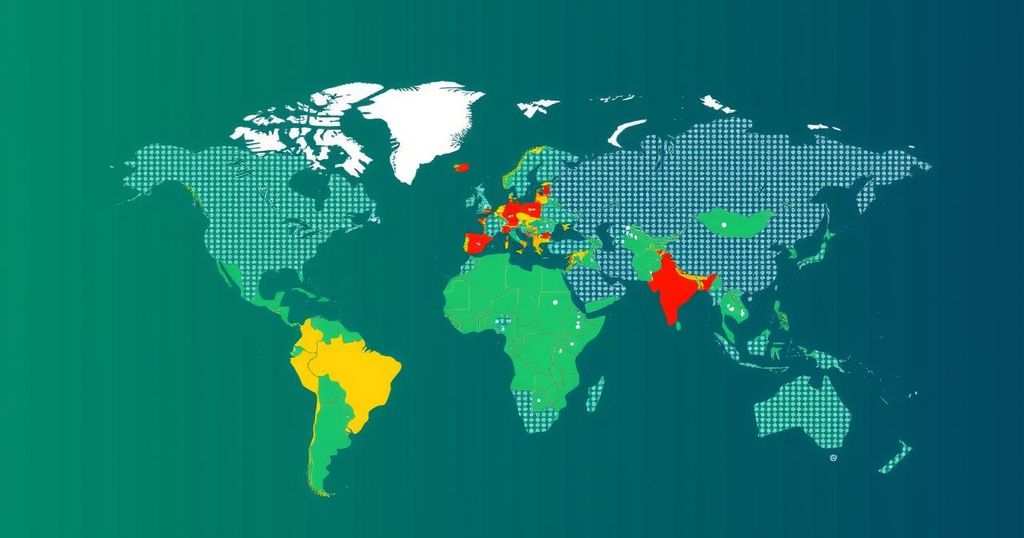The 2024 election year has highlighted a global decline in commitment to climate action, as many countries elected leaders skeptical of environmental policies. Catastrophic climate events continue to unfold, yet political priorities have shifted towards immediate economic concerns. Key figures such as Donald Trump have gained traction by dismissing climate change, reflecting a significant backlash against previous climate initiatives. Amidst a rising populist trend, urgent actions and accountability concerning climate change are becoming increasingly crucial.
The year 2024 is marked as a pivotal election year globally, revealing a troubling decline in commitment to addressing the escalating climate crisis. Despite a backdrop of severe climate events and record-breaking temperatures, political choices across numerous countries illustrate a wavering resolve towards climate action. Key figures, including Donald Trump, have emerged victorious in major elections, advocating skepticism towards climate initiatives, while populist movements in Europe have similarly downplayed the importance of environmental policies.
Catherine Fieschi, a renowned expert in European politics, emphasizes that the trend reflects a gradual erosion of public prioritization regarding climate change, stating, “It’s been a bad year for climate and we’ve seen a gradual erosion in the public’s commitment to action for a couple of years now.” With increasing global hardships imposed by pandemics, wars, and inflation, climate-related issues have descended in significance within political agendas, echoing with changing rhetoric that shifts focus from environmental urgency to immediate economic concerns.
Countries like India showcased localized climate grievances significantly impacting governance, while right-wing and populist factions across Europe and the United States gained momentum by framing climate initiatives as financially burdensome. In contrast, the United Kingdom demonstrated resilience, with the Labour Party achieving electoral success by endorsing clean energy growth.
Furthermore, the recently convened Cop29 climate summit in Azerbaijan failed to attract substantial leadership engagement and underscored governments’ reluctance to commit to aggressive emissions reductions. Activists voiced discontent regarding the perceived lack of accountability from leading polluters, exemplified in remarks from Edi Rama, the Prime Minister of Albania, who questioned the integrity of climate discourse amid continued environmental degradation.
Despite advancements in renewable energy, there remains an urgent need for decisive actions to avert catastrophic climate effects, as professed by political analysts who caution that time is rapidly dwindling. “Every day lost matters now,” reinforces Jan-Werner Müller, highlighting the pressing necessity for renewed commitment towards climate action. This election year reveals stark contrasts between political aspirations and the persistent demands of the climate crisis, necessitating a reevaluation of priorities to secure a sustainable future.
This article examines the ramifications of the unprecedented election year of 2024 on global climate commitments, as climate crises intensify globally. With key political shifts favoring climate skepticism and populism, the commitment to climate action appears to be diminishing even amid escalating environmental challenges. The juxtaposition of political gains by figures dismissive of the climate crisis against a backdrop of worsening climate events presents a complex narrative of prioritization within electoral agendas. Importantly, it underscores the need for Frank discourse on climate resiliency and accountability among those responsible for environmental stewardship.
In summary, the 2024 election year has accentuated a dwindling commitment to climate action worldwide, with significant electoral victories for populist leaders casting doubt on the future of environmental policies. As climate emergencies mount, the political landscape struggles to prioritize urgent action, leaving a void that could have dire consequences for global sustainability. The overarching narrative reveals an essential need for both political will and public prioritization of climate initiatives to address the escalating crisis effectively, as the time for meaningful intervention is swiftly running out.
Original Source: www.theguardian.com







